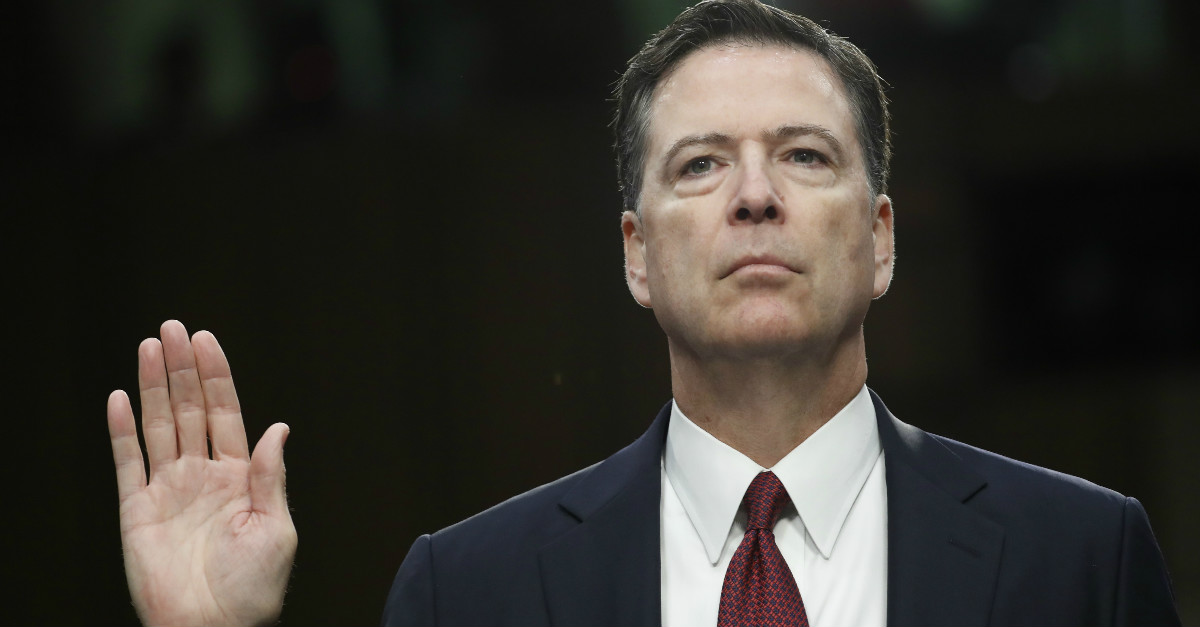At his hearing Thursday, Former FBI Director James Comey said that former Attorney General Loretta Lynch asked him to downplay the Hillary Clinton email investigation. Part of the reason Comey was being questioned was to determine whether President Donald Trump had obstructed the FBI’s ongoing investigation into whether his presidential campaign colluded with Russia during the election. Comey all but said Trump obstructed justice.
Videos by Rare
Comey has admitted that Trump called his former adviser Michael Flynn, a central figure in the Russia investigation, a “good guy.” We can probably assume Lynch thinks Hillary Clinton is a good person too.
RELATED: Comey all but said Trump obstructed justice
This is basically what today’s hearing and these obstruction controversies are about, right? Powerful people looking out for one another because even if Trump, or Clinton, or Flynn technically did something wrong or skirted the law in some fashion, they’re still “good guys.” They didn’t really mean it. They probably didn’t even realize they were breaking the law. Everyone makes mistakes.
Atiba Parker was a good guy. He also got 42 years in prison for selling less than three grams of crack. His only prior conviction was a misdemeanor for marijuana.
John Horner might have been a good guy too. Still, he was sentenced to 25 years in prison for possessing $1,800 worth of painkillers.
Clarence Aaron could have been a good guy as well. He was sentenced to three life terms for a small role in helping two cocaine dealers meet, for which he was paid $1,500.
Parker, Horner and Aaron were all victims of federal mandatory minimum sentencing laws. Each engaged in criminal activity that by law was deserving of punishment, but most reasonable people would agree that the sentences these men were given far outweighed the crimes committed. There are countless similar stories of men and women who have met the same unjust fate.
How many of those family members believe their imprisoned loved one isn’t a bad person at heart, but simply made a mistake? And now they’re just languishing behind bars, needlessly. How many people — who support mandatory minimum sentencing — think anyone who makes a mistake with drugs is automatically a bad person that deserves to get the book thrown at them? It’s the law! Well, Jeff Sessions certainly does.
But does Sessions believe President Trump broke the law? Nah. Does he believe Michael Flynn deserves the scrutiny he’s received? Probably not. He knows Michael. These are good men who just had some missteps. That’s all. You know how it goes. Such is politics.
Basically, if you make mistakes at the highest levels of government other powerful people will work diligently to make sure there is no penalty for it. What Lynch and Trump did sure amounts to obstruction of justice under most definitions (except their own), but since no one will use those words they simply get a pass.
The poor do not have such luxuries. Many good men and women have been thrown into cages for decades for crimes that probably do less societal harm than what many politicians do on any given week.
Such is poverty, where there are many wrong paths that ruin lives forever. Those people don’t have powerful friends.
Federal Judge Mark Bennett recently told CNN that “80% of the mandatory sentences he hands down are unjust — but that he is handcuffed by the law, which leaves no room for judicial discretion to consider a sentence based on individual circumstances of the defendant.”
RELATED: This judge says mandatory minimums are “one of the gravest injustices in the history of America”
Rare’s Bonnie Kristian writes, “Bennett has been on the bench at various levels for nearly three decades, and he’s an outspoken critic of the unjust mandatory minimums Sessions loves. ‘I basically couldn’t live with myself if I didn’t speak out,’ he recently explained. ‘I’m compelled to talk about it because I think it’s one of the gravest injustices in the history of America.”
The judge is right. And that’s where my mind went during Thursday’s hearing. While most cheered and jeered from the partisan left-right bleachers, I kept thinking about the rich-poor divide. Comey was obviously biting his tongue to a degree to protect the status quo, but these are the same leaders who often refuse to give such leeway to others they don’t know, who also make mistakes, but yet are so far removed from elites culturally and financially that it doesn’t matter. So they just rot in prison.
Many of them good guys.



